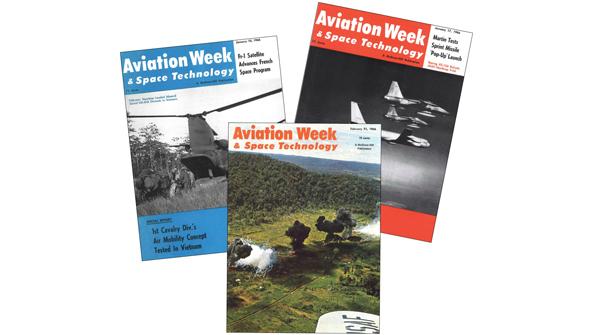
Like a bolt out of the blue, an email from a long-lost colleague I never knew popped up in my inbox. It was from C.M. “Tony” Plattner, an Aviation Week combat reporter and aircraft evaluation pilot nearly six decades ago, who covered the Vietnam War and Cold War. I had seen his name in our digital archives, but I had never spoken with him or heard anyone on our staff—even the retirees—mention him. The reason, it turned out, is that he had stopped writing for Aviation Week by the time I was three years old.
More than half a century later, the 91-year-old is back with a book that tells the fascinating story of his career at Aviation Week and the heavy price he paid to help this magazine earn the nickname “Aviation Leak.” Plattner, a veteran U.S. Marine Corps fighter pilot and captain in the Marine Corps Air Reserve, joined Aviation Week in 1962. One of his early assignments was to analyze the Grumman A-6A (originally A2F) Intruder, a new U.S. Navy attack aircraft.
Plattner used his degree in mathematics and his minor in physics to do some “educated gues-sing” on the aircraft’s performance numbers, which were a closely held secret. The article earned him a blurb on the cover, a plum assignment to Aviation Week’s Los Angeles bureau—and a visit from Office of Naval Intelligence investigators, who accused him of revealing classified information. Plattner denied knowingly receiving or writing about anything classified, but the encounter foreshadowed bigger troubles ahead.
Plattner filed pilot reports on the Boeing 727 and 737 and the McDonnell Douglas DC-9, but his true specialty was in military operations. In 1965, he was sent to South Vietnam to report on the U.S. military’s escalating role in the war against North Vietnamese-backed Viet Cong guerillas. He spent two months there, flying as an observer on nine combat missions. Returning to California with copious notes, he wrote a 14-part, 105-page series that ran over three months in early 1966. A color cover photo (above) from his flight on a raid by four Douglas A-1E Skyraider attack aircraft showed napalm and white phosphorous bombs exploding on a Viet Cong-controlled hamlet during a raid that destroyed 29 buildings.
Plattner led off his meticulous reporting with several troubling conclusions. He observed that the rapid military buildup in Vietnam was not changing the balance of the conflict, nor were U.S. air strikes failing to slow the infiltration of supplies and combatants into South Vietnam. “Without a series of decisive, crippling victories over the Viet Cong, there appears to be no short-term solution to the problem of winning the war in Vietnam in the conventional sense,” he wrote.
It was a damning rebuttal to the U.S. government’s claim that an end to the war was within reach. “Your Vietnam series was one of the finest editorial jobs this magazine has ever done,” Robert Hotz, Aviation Week’s larger-than-life editor-in-chief, told Plattner in a memo. “The reaction has been tremendous, with ‘the best material I have ever read on Vietnam’ an almost standard comment.”
It took nearly a year, but the government struck back. The Marines lowered Plattner’s reserve status and suspended him from flying. “The quality of his reporting cannot be disputed,” Marine Corps Commandant Wallace M. Greene, Jr., wrote in a letter to a congressman whom Plattner had enlisted for help. “What can be disputed, however, is the inclusion in his articles of sensitive information, subsequently determined to have been classified, which unquestionably was of material benefit to enemy forces in North Vietnam.”
The saga dragged on for several years. The Defense Department forwarded the matter to the Justice Department, which declined to prosecute Plattner in civil court. The Marine Corps tried to pressure him into resigning. Plattner fought back, enlisting coverage from The Washington Post and other media outlets. Ultimately, the Board for Correction of Naval Records ordered the Marines to remove all negative information from Plattner’s files, and he was promoted in rank.
But Plattner was no longer at Aviation Week. Wanting a higher salary and disappointed that the company was not more active in his defense, he left in 1970 for Garrett Corp., an aerospace company that later became part of Honeywell. He worked in public relations, then market development and eventually sales, retiring in 1997.
His just-published book—Exoneration Finally!—is available from Amazon and Barnes & Noble. Plattner confesses he was never known for his brevity, and parts of the book would benefit from a little less detail. That said, it provides a fascinating look at the history of Aviation Week and the story behind the stories.
Access the Aviation Week & Space Technology Archive with over 100+ years of content here.





Comments
Sounds like an interesting book - but I couldn't find it on Amazon but I did find it on Barnes & Nobles.
I have been receiving AW&ST since 1963. If I would not get arrested I would go to The national cemetery and dig up Defense Secretary McNamara bones and burn them. I lost friends in that war and from people I knew people in the military and having a security clearance there was enough information to know the government, including President Johnson and his staff were lying to the American people. I was for stopping the spread of communism, but also all out to win the war. My uncles who served in WW-II were alarmed at the lies being told to the people. It was evident from the pentagon papers that McNamara told the president and his staff that we could not win the war.
In fact there just was an op-Ed in the Pittsburgh Post Gazette by a retired scholar at Carnegie Mellon University who said the Pentagon papers should be published to show how much the government was lying. A friend who was an F-105 pilot in Nam is dead because of McNamara’s policies, that is, they could not bomb the SAM sites because of McNamara’s stupidity. Sorry to unload on you but, but that war still sticks in my mind and I am a healthy 82 year old that still has a bone to pick with the government on the Vietnam war.
Thanks,
John Ellis
But you could not have won.
What hurt Pentagon the most was not that the editorial showed that the was was not winnable, but that it confirmed what most of the world already knew, that the US leads it through an organized campaign of war crimes.